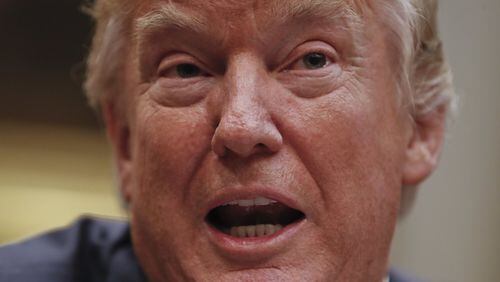In addition to one of President Trump's stated reasons for pulling the United States out of the Paris climate accord, PolitiFact last week paid attention to the Tuesday debate between candidates in Georgia's 6th District congressional race. We looked at statements by Democrat Jon Ossoff about Republican Karen Handel's past role in reduced funding for breast cancer screening and by Handel about money the U.S. sent to Iran being used to aid terrorism. Here are abbreviated versions of our fact checks. Full versions can be found at www.politifact.com.
“China will be allowed to build hundreds of additional coal plants. So we can’t build the plants, but they can, according to this (Paris) agreement.”
— Donald Trump on Thursday, June 1, 2017 in a speech at the White House
The agreement never uses the word coal, nor spells out how many coal-fired plants any country can build.
China's blueprint for what it plans to do gives itself until 2030 for its greenhouse gas emissions to peak. In contrast, the U.S. blueprint says it "intends to achieve an economy-wide target of reducing its greenhouse gas emissions by 26-28 percent below its 2005 level in 2025."
Critics of the arrangement point to China’s rising emissions as evidence of a fundamental unfairness. As Trump put it, the Chinese “can do whatever they want for 13 years.”
Trump’s language gives the agreement more legal weight than it actually has, and he overlooks other parts of China’s plan that aim to “control total coal consumption” and increase the use of renewable energy supplies.
China said it would reduce the carbon intensity of its economy by 60 to 65 percent below 2005 levels and increase the share of non-fossil energy to around 20 percent. And to get there, it would start changing its policies today.
Our ruling
The White House offered no legal argument to back up Trump’s assertion, and the text of the agreement does not support it. The Paris agreement never mentions coal, and in Trump’s own words, it is nonbinding.
We rate this claim False.
“In 2012, you were discussing how you led the effort to defund breast cancer screenings at Planned Parenthood.”
— Jon Ossoff on Tuesday, June 6th, 2017 in a debate
Karen Handel did a media interview shortly after her February 2012 resignation as the Komen foundation’s vice president of public policy. Her departure came after the group’s decision to pull Planned Parenthood’s breast cancer screening funding caused a firestorm.
First, Handel downplayed her personal role — similarly to the way she pushed back in her debate with Ossoff. “I was part of (the) decision-making process,” Handel told the reporter, “but I was not the sole decider.”
But then Handel pivoted to her feelings about the role she played, saying, “I embrace the fact that I was involved in the project.”
Finally, she said: “I embrace the fact that I led the project.”
Our ruling
Handel did say that she led efforts, but she also said at the time that the decision wasn’t entirely hers, and that Komen’s board ultimately approved the move, which was later reversed.
We rate Ossoff’s statement Mostly True.
“Nearly $2 billion in cash was flown over to Iran, money that the Obama administration has admitted is being used for terrorists and to support further activities there.”
— Karen Handel on Tuesday, June 6th, 2017 in a debate
Handel's staff pointed to a March 17, 2016, letter from the State Department saying Iran had received about $1.7 billion as part of the nuclear agreement, reimbursement for U.S. military equipment Iran had paid for but that was never delivered after the 1979 Iranian revolution.
In August 2016, many news organizations reported the delivery of $400 million in cash, in an unmarked cargo plane after American officials were certain that three Americans held in Iran were on their way home.
It is not known how the remaining $1.3 billion made its way to Iran.
Former Secretary of State John Kerry said in a January 2016 interview: "I think that some of it will end up in the hands of the IRGC (Islamic Revolutionary Guards Corps) or of other entities, some of which are labeled terrorists. To some degree, I'm not going to sit here and tell you that every component of that can be prevented."
The IRGC, Iran’s premier security institution, fields an army, navy and air force. In 2007, the U.S. Treasury Department designated the IRGC’s elite Quds Force a terrorist supporter for aiding the Taliban and other terrorist organizations.
Our ruling
Handel said the Obama administration admitted that nearly $2 billion flown to Iran is being used to fund terrorism and various supporting activities. One way or another, the United States transferred $1.7 billion owed to Iran. Kerry said it was likely some portion of any money Iran received would go to its top security organization and some of that money would end up advancing terrorism. That’s not quite the same as saying all of the money would go for terrorists and activities to support terrorism as Handel said.
We rate this claim Half True.






